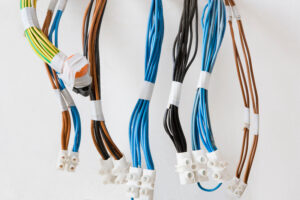Read our communication regarding new measures our team is enacting in this critical time.
 We’re Always Open!
We’re Always Open!703-291-1926
Identifying Your Home’s Electrical Wiring

A basic understanding of your home’s complex electrical system can include wiring, colors, sizing, and codes to help with small DIY projects, which we will explore below.
Avoid wiring problems and electrical system failures by keeping all work up to code. Hiring a licensed electrician can prevent code violations and reduce safety risks.
Why It’s important To Know About Your Home’s Electrical Wiring
Basic wiring knowledge can help with renovation projects and repairs if you want to reset the breaker box, install a ceiling fan, or add a light dimmer.
Any electrical wiring changes must adhere to the National Electrical Code and ordinances in your area to avoid fire and shock risks.
Different Types of Wires Found in Your Home
The wiring inside and outside your home includes different gauges, codes, and labeling. Examples include:
Stranded and solid wiring
Pushing a wire through a conduit requires solid wiring, while stranded pulls a wire.
Non-metallic or Romex
Popular in homes built after the 1960s, it has three or more conductors in a plastic sleeve and includes neutral ground and hot wires.
Armored cable
If NM or Romex are not allowed in a home, armored cable is used. Dating back to the 1900s, it’s not ideal for commercial properties or residences over three stories high.
Underground feeder cable
Ideal for wet conditions and outdoors, it has a ground, neutral, and hot wire, is non-metallic, and can be buried underground.
Metal-clad cable
Useful for unfinished basements, it can withstand the physical elements.
Low-voltage wires
These wires are for circuits under 50 volts and used in thermostats, doorbells, and outdoor lighting. At 12-22 gauge, they have a cable sheath or insulated covering.
Data and phone wires
Found in homes with landlines, they use four to eight low-voltage wires, are Category/Cat 5, and have eight wires for optimal data and phone transmissions.
Electrical wiring channels
Plastic channels or electric channel raceways organize wiring in a home or business and reduce trip/fall hazards. They can be flat, square, domed, or round.
The difference between a cable and a wire
People often interchange the words “wire” and “cable.” Wires either bare or insulate materials or conductors in jackets that carry electricity.
Cables can combine two or more wires packaged together within a single jacket.
What Different Colors Mean
Cables have specific sheath color codes to determine their size, amperage, and wires inside. The colors can include:
- Black with 6-8 gauge wiring and 45-60 amps
- Orange with 10-gauge wires and 30-amps
- Yellow with 12-gauge wiring and 20-amps
- White with 14-gauge wiring and 15-amps
- Gray is for underground feeders
With different wire color codes for your home’s electrical system, the most common include:
- White: Neutral wires complete a circuit and carry the current to a panel.
- Red/black: Hotwires carry electrical currents from a panel to an appliance, light fixture, or switch.
- Green/bare: Ground wires create paths from a current to the breaker.
Labeling & wire size
Cables and wires use labels to help identify the wire’s size, number of wires, material, insulation type, and other rating details. The labeling is on an exterior cable sheath or wire insulation.
The smaller the wire, the bigger its gauge. The American Wire Gauge system regulates sizes, and wires must match amperages in a circuit to avoid fire risks.
Why Choose John Nugent?
Whether you need a panel upgrade, new outlets, or appliance wiring, rely on John Nugent for high-quality electrical installations, repairs, replacements, and maintenance.
Founded in 1975, John Nugent & Sons provides top-notch residential and commercial electrical services. Whether your goal is business code corrections or a whole home electrical safety inspection, we provide free estimates, flexible financing, and 10% maintenance discounts.
With excellent reviews, award-winning service, and 24/7 emergency service, trust us with your electrical needs!
Schedule same-day electrical repair in McLean, VA. Call John Nugent at (703) 291-1926.









